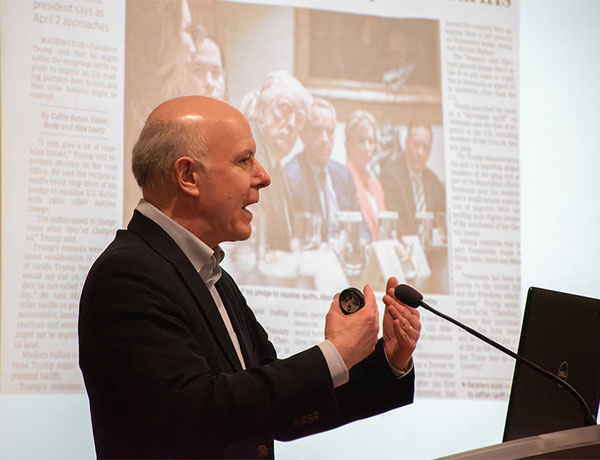
Irwin, the John French Professor of Economics at Dartmouth College, was the speaker at the University of Hartford’s 2025 Deeds Symposium. The title of his discussion, in front of a lively crowd in Wilde Auditorium, was “Trump, Tariffs, and Trade: What’s at Stake?” — and Irwin was unequivocal that what’s at stake is nothing less than the health of the economy.
Irwin took a deep dive into the history of President Trump’s attitude towards tariffs – starting with some of his views as a real estate developer in the 1980s. Irwin cited research showing that, far from protecting American jobs and stimulating domestic manufacturing, tariffs could result in higher costs for American businesses and consumers, with very little benefit. Lower-income Americans, he said, would wind up paying the majority of the cost.
Irwin said the ripple effects of the tariffs will hike prices on a wide range of goods, as other countries institute retaliatory tariffs of their own. Products from bourbon to motorcycles to avocados would be more expensive and therefore more scarce, he said – illustrating the point by tossing avocados into the audience.
Irwin also referenced the stubbornly high price of eggs. Taking aim at one of the Trump administration’s rationales for imposing tariffs on Canada – that fentanyl is being smuggled across the border – Irwin was dismissive: “Zero fentanyl is coming across. … In fact, there’s more smuggling of eggs across the border than fentanyl.”
Still, while he views tariffs as bad policy, Irwin says the fundamentals of the economy are still strong, and he doesn’t see a recession or depression in America’s near future.
And while Wall Street’s jitters are an important indicator, Irwin said, it’s best not to read too much into the market’s ups and downs. “Markets are not the economy,” he said. “You should never confuse the stock market with Main Street or the stock market with the economy. But they are a signal about future profitability and the outlook for the economy, and we have to take these seriously.”